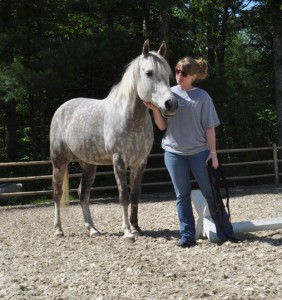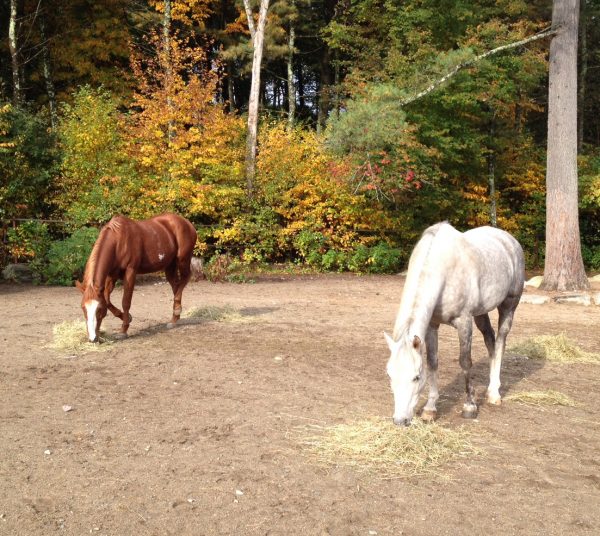Horses for Heroes: After assistance from the Lawyers Clearinghouse, Massachusetts nonprofit moves forward with plan to help veterans

Julie Lovely started riding horses at the age of ten. When she was eleven, she began volunteering with a therapeutic riding program at the urging of her Spanish teacher, who was also an avid rider.
Therapeutic riding is a form of equine therapy, which focuses on building a relationship between the horse and the rider in order to foster mental and physical healing. Studies have shown that such therapy leads to increased muscular and skeletal function, due to how it engages the body, as well as improved mood and behavior, due to the concentration and patience required to work with horses.
Lovely volunteered with therapeutic riding programs throughout college, continuing when she moved to Massachusetts.
“It was always something that I loved, and was a big part of my life growing up, and something that I always stuck with,” she said.
Knowing that she eventually wanted to start her own program – a goal that was reinforced after experiencing a trauma that left her with post-traumatic stress disorder, as well as after watching her father deal with a traumatic brain injury following a car accident – Lovely returned to school for her MBA.
Today, Lovely is the executive director of Wild Hearts, an equine-assisted therapy program and 501(c)(3) nonprofit, which she runs out of her farm in West Bridgewater.

When she was starting Wild Hearts, Lovely knew she wanted it to be a nonprofit. A friend whose daughter was receiving hippotherapy, a form of equine therapy, told her about the Lawyers Clearinghouse and its work with prospective nonprofits.
Lovely was paired with an attorney from Boston law firm Nutter McClennen & Fish LLP. With the attorney’s help, Lovely drafted the articles of incorporation, a legal document filed with the state, which announces the intention to become a nonprofit, and contains basic information about the organization’s mission. After Wild Hearts was incorporated, the attorney put together an application for tax-exempt status.
Lovely said she had always heard that the process to become a nonprofit could be complicated, but that it went very smoothly for Wild Hearts.
“We were so grateful to have been paired up with this attorney who did this work for us pro bono, because she was really able to put together a fantastic application that had all the ducks in a row. She was able to interact with the IRS for us, so there was really no pushback. They got our application, they had a few very minor questions that we were able to respond to really easily, and then they were able to approve it,” she said.
Wild Hearts has been in operation since 2009. Though the organization originally offered general therapeutic riding, intended for people with physical challenges, Lovely and her staff noticed that a lot of their clients were seeking help for mental health reasons.
“We had people that were interested in interacting with the horses because they had experienced trauma, they had depression or anxiety, and as the program changed, I really realized that if we wanted to serve people the way that we needed to, and if we wanted to help them the way they needed to be helped, we really needed to focus more on equine-facilitated psychotherapy,” Lovely said.
Lovely decided to bring in a therapist to help administer a weekly psychotherapy program, and the organization made a shift from offering mounted programs to offering programs where clients work with the horse from the ground.
As Wild Hearts started to focus more on mental health, Lovely set to work planning Wild Hearts Horses for Heroes, which will be the organization’s premiere program.
Set to launch with a benefit on April 26, Wild Hearts Horses for Heroes is a free, ten-week program designed for veterans suffering from what Lovely calls the “invisible wounds of war,” such as post-traumatic stress disorder (PTSD) and traumatic brain injury (TBI). She explained that the program will fill a gap, because while there are other equine-assisted therapy programs, relatively few are designed specifically for veterans.
Wild Hearts Horses for Heroes will be run by a licensed therapist and a natural horsemanship trainer. Veterans will work with the horses from the ground, focusing on the behavioral and communications aspects of such interactions.
“One of the great things about horses, and the reason why this is so effective, is that horses are so in the moment. And that’s why this really helps people who have experienced trauma,” Lovely said. “It’s great for reflecting on attitudes towards their own sense of self-worth and self-esteem, reflecting on how they communicate with their own family, their friends. Our horses help veterans learn to trust again.”
Eventually, Lovely hopes to build a facility where Wild Hearts can host free retreats for veterans from around the country. In turn, veterans would also have the opportunity to be involved in the rehabilitation of rescue horses.
“[They] will help these horses transition to a new life, similar to the way they’re transitioning to civilian life,” she said.
It has been over twenty years since Julie Lovely first volunteered with a therapeutic riding program at the age of eleven. Though Wild Hearts has changed in ways Lovely could not have foreseen, it remains a testament to her determination, as well as an invaluable resource to the people it serves.
“It’s an amazing treatment, and it’s effective, and it works,” Lovely said.